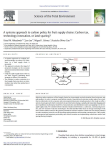Alkaabneh F.M., Lee J., Gómez M.I., Gao H.O. (2021). A systems approach to carbon policy for fruit supply chains: carbon tax, technology innovation, or land sparing? Science of the Total Environment, 01/05/2021, vol. 767, p. 1-11.
https://doi.org/10.1016/j.scitotenv.2020.144211
https://doi.org/10.1016/j.scitotenv.2020.144211
| Titre : | A systems approach to carbon policy for fruit supply chains: carbon tax, technology innovation, or land sparing? (2021) |
| Auteurs : | F.M. Alkaabneh ; J. Lee ; M.I. Gómez ; H.O. Gao |
| Type de document : | Article |
| Dans : | Science of the Total Environment (vol. 767, 1 May 2021) |
| Article en page(s) : | p. 1-11 |
| Langues : | Anglais |
| Langues du résumé : | Anglais |
| Catégories : |
Catégories principales 16 - TRANSPORT. INFRASTRUCTURE. ENERGIE ; 16.2 - InfrastructureThésaurus IAMM CHAINE D'APPROVISIONNEMENT ; FRUIT ; TRANSPORT ; CARBONE ; BILAN CARBONE ; INNOVATION ; NOUVELLE TECHNOLOGIE ; IMPOT ; REDUCTION DES EMISSIONS ; INDUSTRIE ALIMENTAIRE |
| Résumé : | Reducing carbon emissions of food supply chains has increasingly received attention from businesses and policymakers. In order to propose sound policies aimed at lowering such emissions, policy makers favor tools that are informative in the economic and environmental dimensions simultaneously. In this study we offer a systems-based approach which is intended to do just that by developing a spatially and temporally disaggregated price equilibrium mathematical model for a food production and distribution system and applying it to the U.S. apple supply chain. We considered three emission reduction interventions: a carbon tax, a land-sparing incentive, and new emission-reduction technologies. We find that R&D which leads to storage technologies with lower carbon emission rates has the greatest potential for emission reduction. Carbon taxes also has the potential to reduce emissions, but at the cost of decreasing apple production and increasing consumer price. These results are unexpected and important, particularly since several countries are implementing carbon taxes and/or land sparing/sharing strategies. |
| Cote : | Réservé lecteur CIHEAM |
| URL / DOI : | https://doi.org/10.1016/j.scitotenv.2020.144211 |







